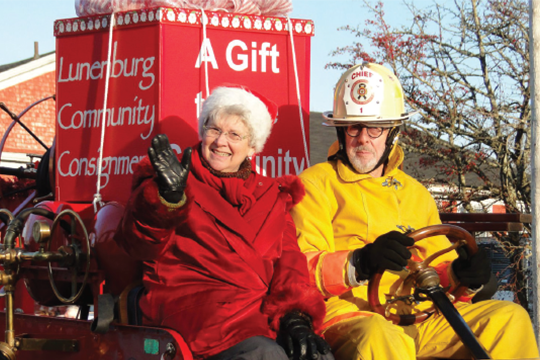
Cheryl Lamerson and husband Will Brooks greet the crowds while aboard an antique fire truck during last November’s Lunenburg Santa Parade. Photo: Vicki Mossman-Conrad, Lunenburg
With its reputation for discipline and uniformity, the military might not seem like a natural fit for someone who considers themselves a non-traditionalist. But for a teenaged girl in 1975 the Canadian Armed Forces offered a unique path to fulfilment and independence.
When Cheryl Lamerson enlisted straight out of high school, she was enticed by the offer of a university education and the possibility of carving out new space in the world for women. That early and formative choice took a lot of ambition and a bit of idealism, and those traits form an unbroken thread that weaves through the following 40 or so years of Lamerson’s life, up to the present.
“You go with what you know,” she says humbly of the way she’s turned her retirement into a productive and meaningful project.
What she knows is human behaviour, having studied organizational psychology up to academia’s highest level, earning first an undergraduate degree, then a master’s, and finally a PhD through military scholarship. For the better part of three decades Lamerson used that knowledge to advise the military on how to make the best use of its personnel. She looks back with pride at some of the highlights of her career: she worked on programs to equalize the recruitment and inclusion of women and racial minorities, and she studied and devised ways of tackling what she calls “combat stress,” or what many know as post-traumatic stress.
While her current endeavours — which are vast and diverse but can be summed up as volunteer work — may seem a far cry from military psychology, she sees it differently.
“(It’s) about looking at the skills that you have from the military and then using those skills in a different setting. So, the leadership skills that I had, the team building or the teamwork skills, and even the motivational skills, they all make sense, whether it's talking about the garden club, the genealogical society, the heritage society, the town committees and Lunenburg Community Consignment” she says, referring to some of her retirement occupations.
At the time of her retirement eight years ago, Lamerson was managing more than 100 psychologists, sociologists and associates out of a military personnel office in Ottawa. Today, the retired colonel oversees 100 volunteers who work at Lunenburg Community Consignment — the shop that she and her husband, retired clinical psychologist Will Brooks, opened after moving to Nova Scotia to start their retirement.
Lamerson says she came up with the idea for the social enterprise based on her love of second-hand and antique items, and a desire to contribute to her community. She gives 50 per cent of the proceeds from sales back to the consignors, keeps 30 per cent to operate the store, and gives the remaining 20 per cent to local and national charities chosen by her volunteers. She says that in 5 1/2 years, she’s donated about $110,000 from the store’s proceeds.
Lamerson seems to have taken to retirement with relish, filling up her time running the consignment shop, and volunteering both locally and with larger organizations like the National Association of Federal Retirees. Undoubtedly, any general understanding of human psychology would serve to ease such a transition, but even more to the point, Lamerson worked for several years on a military program that helped members find post-military careers. As she approached her own retirement, she counselled herself in much the same way as she would have done for any other retiring colleague.
The result is that she and Brooks have created a life for themselves that’s as busy as a military base, but as unconventional as a woman in the armed forces in 1975.
Not only is Lamerson and Brooks’ home bustling with regular overnight guests — visiting locum doctors and students and artists from the Lunenburg Academy of Music Performance — but it’s also the site of a museum. It’s a pet project of Brooks’ that hearkens back to his career with various fire departments. He and Lamerson built a firehouse, “complete with a couple of fire engines in it and a little museum upstairs,” as Brooks describes it.
Brooks credits his work in the fire service with two milestones in his life: introducing him to his wife — Lamerson reached out to him professionally to learn about a project on post-traumatic stress that he was working on — and inspiring him to establish the Canadian Fallen Firefighters Foundation. The charitable organization recognizes fallen firefighters with a memorial wall in Ottawa, and offers financial supports to their families.
“I think the general theme is that we're both people who like to help people and feel we should make a contribution if we can,” Brooks says of himself and Lamerson.
Almost in unison the couple describes their volunteerism and community involvement as “fun,” as if it were a pastime, but it seems to be more pervasive than that. Lamerson and Brooks make such regular contributions of their time, space, knowledge and experience that it’s simply a matter of routine — it’s a lifestyle.

